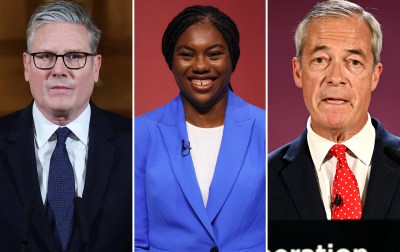Turn any article into a podcast. Upgrade now to start listening.
Premium Members can share articles with friends & family to bypass the paywall.
You’re reading The Morning Dispatch, our flagship daily newsletter explaining all the news you need to know today in fewer than 10 minutes. To unlock the full version, become a Dispatch member today.
Happy Monday! Speaking at an event over the weekend about tensions with the United States, Venezuelan dictator Nicolás Maduro broke out into song with John Lennon’s “Imagine.” And with that, TMD officially endorses regime change in Venezuela.
Quick Hits: Today’s Top Stories
- President Donald Trump signed an executive order on Friday that lifted tariffs on a wide range of imported food products, including beef, coffee and tea, bananas, oranges, tropical fruits and fruit juice, cocoa, spices, and tomatoes, as well as certain fertilizers. The administration claimed that the original tariffs were no longer necessary due to trade agreements enacted since they were levied, but the move comes amid an effort to lower grocery prices, particularly given concerns about the rising cost of beef. Also on Friday, the U.S. and Swiss governments agreed to a trade deal cutting tariffs on Swiss imports from 39 to 15 percent. Swiss companies pledged to invest $200 billion in the U.S. by the end of 2028.
- The Israeli government decided on Sunday to establish its own investigation into the failures surrounding the October 7 massacre, rather than set up a traditional official state commission of inquiry. Leaders in Netanyahu’s government claimed the probe would have “full investigative authority,” but the Cabinet did not agree in Sunday’s meeting on the commission’s organization or scope. Israel’s High Court of Justice had told the government last month that there was “no real argument” against establishing a state commission of inquiry, giving the government 30 days to submit an update on the commission’s establishment. On Saturday, Axios reported that the Israeli government is not opposed to a prospective Saudi Arabian purchase of U.S. F-35 fighter jets, provided the country also agrees to normalize relations with Israel.
- Ukrainian President Volodymyr Zelensky said Sunday that he was working to resume prisoner-of-war exchanges with Russia to secure the release of up to 1,200 Ukrainian prisoners and announced a slew of changes to “reboot” the country’s energy sector following corruption scandals, including nominating new leadership officials for energy inspection agencies and the country’s State Property Fund. The move comes as leaders of European nations have expressed concern about corruption in the war-torn nation. “We expect Ukraine to press ahead with anti-corruption measures and reforms in its own country,” German Chancellor Friedrich Merz said last week. Meanwhile, Finnish President Alexander Stubb told the Associated Press that he was “not very optimistic” that a Russia-Ukraine ceasefire deal could be reached this year and urged European nations to further support Ukraine’s defense against Russia. Russia struck Kharkiv this morning, killing three, and attacked Ukraine’s capital city of Kyiv in an overnight missile and drone strike on Friday, killing at least six people. Ukraine, meanwhile, continues to target Russian energy infrastructure, claiming responsibility for an airstrike on an oil facility in Novokuybyshevsk, and Zelensky is in Paris this morning, seeking to purchase anti-missile systems.
- In a Truth Social post on Sunday night, Trump told House Republicans that they should vote in favor of releasing more files related to convicted sex offender Jeffrey Epstein, “because we have nothing to hide, and it’s time to move on from this Democrat Hoax.” On Friday, Trump also announced that he directed Attorney General Pam Bondi and the FBI to investigate potential links between deceased sex offender Jeffrey Epstein and several prominent Democrats, including former President Bill Clinton, former Harvard University president Larry Summers, and LinkedIn co-founder and Democratic donor Reid Hoffman. The House Oversight Committee released 23,000 documents from the Epstein estate on Wednesday, including his emails. Epstein mentioned Clinton, Hoffman, and Summers throughout these emails—but referenced Trump more than any of them. According to the Wall Street Journal’s analysis, Trump is mentioned in 1,670 of the 2,324 email threads. The documents also showed that Epstein texted with non-voting U.S. Delegate Stacey Plaskett of the Virgin Islands during a February 2019 congressional hearing with former Trump attorney Michael Cohen.
- Chile’s presidential election will proceed to a December 14 runoff between the top two finalists after no candidate won an outright majority in the first round of voting on Sunday. Communist Party member and former Labor Minister Jeannette Jara received a plurality of the vote, with 26.8 percent, and right-wing candidate José Antonio Kast finished second with 24 percent. Given that 70 percent of voters supported right-wing candidates in the first round, Kast enters the runoff election as an early favorite. Both candidates have focused their campaigns on being tough on crime and controlling immigration, and the winner of the December election will succeed the country’s leftist incumbent president, Gabriel Boric, who is constitutionally term-limited.
Labour Pains

In the summer of 2024, British Prime Minister Keir Starmer was riding high. His Labour Party had just taken control of the government in July’s parliamentary elections, securing one of the largest majorities in British history: 411 out of Parliament’s 650 seats. After 14 years of rule by the Conservative Party, marked by turmoil over Brexit, COVID, and a succession of five different prime ministers—including Liz Truss, who lasted a mere 49 days—Starmer declared that Britain’s lost decade was over.
“We said we would end the chaos, and we will. We said we would turn the page and we have,” Starmer said in his victory speech. “Today we start the next chapter, begin the work of change, the mission of national renewal, and start to rebuild our country.”
Now, a little more than a year later, Starmer has at least outlasted Truss, but may not stay in office much longer. Labour has been in turmoil since last week, when reports emerged from sources in the Cabinet claiming that Starmer’s staff was preparing to fight off leadership challenges from Labour ministers, including Health Secretary Wes Streeting, who has denied any plans to take down his boss. On Saturday, The Telegraph reported that Angela Rayner—Starmer’s former deputy prime minister and housing secretary, who resigned in September after a property tax scandal—was preparing to challenge Starmer’s leadership from Labour’s left. A source close to Rayner claimed the report was “total rubbish.”
But no matter the plans of his Cabinet ministers, the prime minister is in a profoundly vulnerable position. Starmer started his prime ministership with a +10 percent net approval rating; it currently sits at -48 percent. And yet, the Conservative Party has been unable to capitalize upon Labour’s backsliding, remaining similarly unpopular. Amid economic stagnation and anger over high immigration rates, the British public is increasingly disillusioned with the country’s two main parties.
You are receiving the free, truncated version of The Morning Dispatch. To read the full newsletter—and unlock all of our stories, podcasts, and community benefits—join The Dispatch as a paying member.
British law doesn’t mandate another general election until August 2029, but internal party fractures could force Starmer out well before that. And with both Labour and the Conservatives languishing below 20 percent in the polls, Britain’s century-old two-party system may be on the way out, too.
An inability to set a clear course lies at the root of Starmer’s unpopularity. He arrived at Downing Street promising to align the government around five missions, ranging from promoting economic growth to reforming the National Health Service. But the government has continually waffled.
“They just don’t have a clear sense of what they want to achieve in government,” Sam Freedman, a former government adviser for the Department for Education under David Cameron and political analyst who writes the Substack, Comment is Freed, told TMD.
Labour campaigned on a promise not to raise taxes, but for months, Starmer and Chancellor of the Exchequer Rachel Reeves have regularly implied they may have to do so to plug the budget deficit. Then, on Friday, publications reported that Reeves was no longer planning to raise income taxes, sending the bond markets into chaos on the conflicting news.
In a May speech, Starmer promised to reduce legal immigration levels and crack down on illegal migration, warning that Britain risked becoming an “island of strangers” without “fair rules.” The Labour Party’s left immediately erupted in outrage, with some Members of Parliament (MPs) comparing Starmer’s remarks to the infamous 1968 “rivers of blood” speech from anti-immigration politician Enoch Powell. Starmer backed away from that language a month later, but persisted with plans to reduce immigration, pleasing no one.
“In many cases, MPs are really worrying that [Starmer] doesn’t even know what the government’s agenda is,” Philip Cowley, a professor of politics at Queen Mary University, London, told TMD. “There’s nothing there to sell.”
With Labour’s support collapsing, the most likely candidate to seize leadership of the opposition ought to be the Conservative Party (also known as the Tories), the world’s oldest political party. But they’ve struggled to recover from voters’ exhaustion with them after 14 years in power, and their new leader, Kemi Badenoch, has failed to attract much support.
“I think the Tories are pretty much stuffed,” Freedman argued. Hovering at 17 percent in the polls, with staffers and members fleeing to the party’s populist-right competitor, Reform, the Tories risk being locked out of power by Britain’s winner-take-all election system.
“The problem for the two main parties,” Cowley said, “is that once you’re not necessarily one of the two main parties, this thing comes around and kicks you right up the arse.”
Currently, both Labour and the Tories are languishing below 20 percent in Politico Europe’s Poll of Polls. Three other parties, all of which currently hold seats in Parliament, are polling at 13 percent or above: the far-left Greens, the center-left Liberal Democrats, and the right-populist Reform Party, with comparatively mammoth support of 29 percent.
Reform—which began as the anti-E.U. Brexit Party—now threatens to supplant the Tories as Britain’s party of the right. Its founder, Nigel Farage, has elbowed aside Starmer and Badenoch as the dominant figure in British politics, with blistering critiques of the establishment and promises to drastically reduce immigration—alongside advertisements for gold bullion and paid Cameo videos.
Reform’s stances on migration are the most radically restrictionist in modern British political history. In September, the party rolled out an immigration platform that proposed abolishing the policy of Indefinite Leave to Remain (ILR), which gives migrants the right to apply for benefits after residing in Britain for five years. Instead, Farage said that migrants should have to reapply for visas every five years.
Reform’s policy chief, Zia Yusuf, said the goal is for “hundreds of thousands of people having to apply and ultimately losing their settled status in the U.K.,” leading to their voluntary departure. Ben Ansell, a professor of democratic institutions at Oxford University’s Nuffield College, told TMD that “it would be the most extreme example that I could think of, of an anti-immigration policy in any wealthy country,” comparing it to the U.S. abolishing green cards. Farage has also promised large-scale deportations, although the details remain fuzzy.
Farage maintains that mass deportations, voluntary or not, will save Britain more than $300 billion over several decades, claims which Reeves claimed “have no basis in reality.” But after multiple Tory prime ministers, including Brexit leader Boris Johnson, presided over several years of record immigration levels—what Farage terms the “Boris wave”—a critical mass of British voters are indicating that they’re willing to turn to a new party.
Labour is also facing attacks from its own end of the ideological spectrum. The far-left Green Party, led by Zach Polanski, has seen a boom in membership and a rise in poll numbers, with Polanski accusing Starmer of threatening to “hand this country on a plate” to Farage by moving to the right on immigration. With a core of young, disaffected progressives, the Greens may be able to take several Labour seats in London, where such voters are concentrated.
Even smaller parties, whose votes are more concentrated than the Greens, will also take away seats. The Liberal Democrats have found success in southeast England and now hold 72 seats in Parliament. Plaid Cymru, the Welsh nationalist party, and the Scottish Nationalists are both strong in their respective nations. In a special election for a seat in Caerphilly, Wales—which Labour has held for decades—a Plaid Cymru candidate won with 47 percent of the vote, ahead of Reform’s 36 percent. Labour finished with only 11 percent of the vote.
A five-party contest (with smaller parties in Wales, Scotland, and Northern Ireland for good measure) is a novel development in British politics.
“It’s the first time this has happened, with so many parties,” Sir Vernon Bogdanor, a political scientist and historian of British politics at King’s College London, told TMD. Bogdanor also noted that in Britain’s winner-take-all system, a fractured electorate can lead to minority rule: Starmer won his massive parliamentary majority with only 34 percent of the vote, and Reform could feasibly win an outright majority with its current mark of 29 percent.
But why do voters’ frustrations seem to extend not only to the current government, but to Britain’s established party system? Its stagnant economy is a significant factor. Britain used to control an empire. Now, its economy has fallen behind Italy’s. Poland is expected to surpass Britain’s GDP per capita by 2040, potentially sooner.
The average Brit spends a third of his or her income on rent. The average house price is nine times higher than a year’s average wages. Inflation remains higher than government targets, and austerity measures are politically toxic in a country where average weekly wages have barely increased since the 2008 financial crisis. Roughly 10 percent of the population currently sits on a National Health Service waiting list, and prisons are so overcrowded that violent criminals are often released early. In this environment, Reform’s anti-immigration message is potent.
But it may be years until the next electoral challenge to Labour’s majority, Freedman noted, and the party still has time to turn things around. But even if it does, he said, “I suspect it will involve changing the prime minister, unless he can reveal a political ability that has so far not been apparent at all.”
Today’s Must-Read
AI is making it possible to deny death. What could go wrong? In his latest piece for The Dispatch, Oliver Jia—author of the Foreign Perspectives newsletter—examines how AI is fundamentally reshaping our relationship with mortality, and why we should be deeply concerned. From holographic Stan Lee appearances at Comic-Con to CGI resurrections of dead actors in films, tech companies and Hollywood are racing to make mortality optional, raising urgent questions about consent, exploitation, and the psychological toll of denying grief. Jia argues these digital resurrections are fraudulent substitutes that can never capture the totality of a human life, warning we’re entering a Black Mirror-esque world where accepting death becomes impossible.
Toeing the Company Line
The Fractured Right Should Learn From a Pope and a President
Coalescing around common loves is the only way forward.
The Anti-Clanker Coalition
A populist opportunity.
Confucian Answers to Modern Angst
The ‘Way’ of Confucius imagines us as threads, not atoms.
Why Should Christians Read Greco-Roman Classics?
Reading ancient texts can take us far beyond mere knowledge.
What’s Next in the Transgender Wars
Our gender debates aren’t going anywhere.
In Other News
Today in America:
- Trump said he “sort of” made a decision regarding prospective U.S. military operations in Venezuela, and later said he’s open to talking with Maduro.
- The Defense Department said that an airstrike carried out on a suspect drug-trafficking vessel in the Caribbean Sea last week killed all four aboard. This was the 20th strike so far.
- Pete Skandalakis, a longtime Georgia prosecutor and director of the nonpartisan Prosecuting Attorneys’ Council of Georgia, will lead the state’s election interference case against Trump, replacing Fulton County District Attorney Fani Willis.
- A federal district judge issued a preliminary injunction holding that the Trump administration can’t fine the University of California over alleged discrimination and concerns of antisemitic civil rights violations.
- The Federal Aviation Administration lifted all restrictions on commercial flights that it had imposed on 40 major airports during the government shutdown.
Around the World:
- A Colombian government airstrike targeting a rebel group in the country’s southern region earlier this week killed at least seven children, per the country’s human rights ombudswoman.
- Argentina received $900 million last month to repay an International Monetary Fund loan, around the same time the U.S. withdrew an identical amount from its IMF account.
- The Czech Republic is planning a new $19 billion nuclear power project to double the country’s nuclear power capacity.
- Government officials in the Democratic Republic of the Congo signed a deal with leaders of the armed rebel group, M23, securing previously negotiated terms designed to stop continued fighting.
- The United Kingdom announced several reforms to its asylum program, including reducing the duration of refugee status from five years to 30 months.
- Japanese Chief Cabinet Secretary Minoru Kihara told China to take more “appropriate measures” after China advised its citizens to avoid traveling to Japan.
On the Money:
- Apple CEO Tim Cook reportedly plans to resign as early as 2026.
- A U.S. Office of Government Ethics report found that former Federal Reserve Governor Adriana Kugler, who resigned in August, had made stock purchases violating the central bank’s ethics code.
- The Labor Department will release its September hiring and unemployment numbers on Thursday, a month and a half late.
- Walmart CEO Doug McMillon, who has led the company since 2014, announced plans to retire early next year.
- A federal bankruptcy court judge approved OxyContin-maker Purdue Pharma’s latest deal to settle thousands of lawsuits. The deal will require the Sackler family, which owns the company, to contribute up to $7 billion over 15 years.
Worth Your Time:
- “Admit It. Gavin Newsom Is the 2028 Front-runner.” (Politico)
- Meghan Bobrowsky profiles Yann LeCun, one of the “godfathers” of artificial intelligence. (Wall Street Journal)
- Dan Levin interviews the two teenagers who made New York’s only affordable housing portal. (New York Times)
- Yelizaveta Surnacheva, Andrei Soshnikov, and Radio Free Europe’s Russian-language investigative unit reveal that Putin uses three almost identical offices across Russia to hide his location. (Radio Free Europe)
- Some charts and graphics on America’s drone arsenal versus China’s, and on the state of AI investing and infrastructure. (Wall Street Journal)
- The 40 best new musicians of 2025. (Stereogum)
Presented Without Comment
CNBC: Woman Pleads Guilty to Lying About Astronaut Wife Accessing Bank Account From Space Station
Also Presented Without Comment
People: United Argues a ‘Window Seat’ Doesn’t Guarantee You a Window in Motion to Dismiss Passenger’s Viral Lawsuit
Let Us Know
Have any thoughts or questions about today’s newsletter? Drop us a note in the comments or by emailing us at tmd.questions@thedispatch.com. We read every submission, and your message could be featured in an upcoming “Behind the Scenes” segment.
Have any thoughts or questions about today’s newsletter? Become a member to unlock commenting privileges and access to a members-only email address. We read every submission, and answer questions in the following edition of TMD.

















Please note that we at The Dispatch hold ourselves, our work, and our commenters to a higher standard than other places on the internet. We welcome comments that foster genuine debate or discussion—including comments critical of us or our work—but responses that include ad hominem attacks on fellow Dispatch members or are intended to stoke fear and anger may be moderated.
With your membership, you only have the ability to comment on The Morning Dispatch articles. Consider upgrading to join the conversation everywhere.